16 Best AI Tools for Insurance Agents in 2026
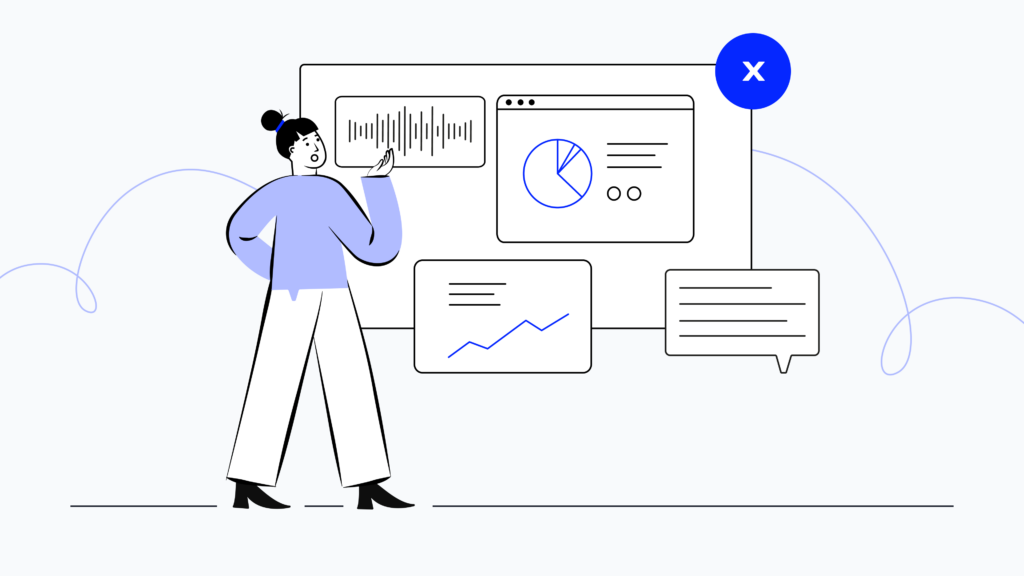
QUICK SUMMARY
Get ready to discover the 16 best AI solutions for insurance companies, along with their key features, benefits, and downsides, as well as prices, and target customers. Keep reading!
TL;DR
As insurance tech specialists, we’ve reviewed and tested 30+ leading AI tools for insurance agents to help streamline workflows, boost productivity, and deliver better client experiences in 2026.
Here are our top 8 picks (out of the 16 that made our list):
-
01
CloudTalk — Best AI tool for insurance teams for AI voice agents and Conversation Intelligence
-
02
Kenyt.AI — Best for AI chatbot that automates policy inquiries and lead qualification
-
03
AlphaChat — Best for multilingual claims automation
-
04
LivePerson — Best for Conversational AI with omnichannel support
-
05
Zendesk Answer Bot — Best for integrated ticketing and knowledge base
-
06
Botsify — Best for AI chatbot with prebuilt insurance templates
-
07
Arteria AI — Best for AI-powered risk analysis
-
08
HubSpot Smart CRM — Best for centralized customer with AI-powered insights
Types of AI Tools That Automate Repetitive Insurance Tasks
Target Area
What It Is
AI Description
AI Examples
Underwriting
The evaluation of an applicant’s information to determine coverage, pricing, etc.
AI analyzes vast amounts of data quickly, improving assessment accuracy and speed.
Predictive analytics, Risk modeling, Automated scoring.
Fraud Detection
Investigation of suspicious claims and policy applications to prevent losses.
Machine learning algorithms identify unusual patterns, flagging potential fraudulent activities.
Anomaly detection,
Pattern recognition,
Real-time alerts.
The review, validation, and subsequent approval or refusal of claims.
AI automates the claims process, reducing the time and effort needed to handle claims.
Chatbots,
AI documentation, Instant approvals.
Customer Service
The support of policy-holders for inquiries, claim assistance, policy updates, and issue resolution.
AI enhances personalized customer interactions, providing fast responses.
Virtual assistants, Chatbots, Personalized recommendations.
Alone, these tools can offer significant benefits in their target areas in terms of productivity and time-saving. But their true value comes to light when you leverage multiple in order to build a comprehensive, insurance tech tool stack. For example, pairing fraud detection systems with tools like an AI image detector can help insurers verify visual claims more accurately and quickly flag any potential image manipulation or inconsistencies.
In combination, these AI solutions for insurance help you create a faster, more accurate insurance process that both saves you money and helps you generate additional revenue via higher outreach and more satisfied customers.
How We Chose the Best AI Tools for Insurance
To bring you this guide, we compared 30+ leading AI platforms used by insurance professionals, drawing on feedback from over 2,000 users across trusted review sites like G2, Capterra, and TrustRadius.
The 16 best AI tools were selected based on their performance in real insurance workflows—quoting, underwriting, claims handling, customer service, and compliance. We also considered ease of use, integrations (CRMs, AMS, policy systems), and data security.
What you’ll find here:
Only tools that deliver real, measurable value—plus clear guidance on which platforms best fit brokers, agencies, and carriers at different stages of growth.
Why Trust Our Software Reviews?
For nearly a decade, we’ve helped 30,000+ professionals choose smarter tools to modernize their workflows. We’ve reviewed 200+ products, analyzed over 5,500 verified reviews, and sourced firsthand insights from brokers, agents, and insurance tech leaders.
In the last year alone, we’ve published 1,000+ expert-written articles to help insurance teams adopt technology with confidence—not guesswork.
Learn how we keep our content integrity and our software review methodology.
16 Best AI Tools for Insurance Agents in 2026
As an industry inundated with paperwork and lengthy, repetitive processes, insurance was quick to adopt AI. And now, AI for insurance companies is expected to increase productivity and lower operating costs by 40%*—turning automation into a clear competitive advantage.
To help you make the most of this shift, we’ve curated a succinct yet comprehensive overview of the 16 best AI tools for insurance companies available on the market in 2026.
If you’re more of a visual learner, we’ve also got a video where you can learn about the benefits of AI for insurance sales and some of the top names in the game today.
#1 CloudTalk
CloudTalk is an AI-powered business communication software, designed to help you have better, crystal-clear customer conversations, while improving your outbound and inbound efforts across 1 + countries via calls, SMS, and WhatsApp.
Key Features:
- Conversation Intelligence AI
- Intelligent Call Routing & IVR
- Power & Smart Dialer Software
- Real-Time Analytics & Call Monitoring
- 3rd Party Integrations for CRMs, Helpdesks, etc
| Pros | Cons |
|---|---|
| Crystal-clear call quality across 1+ countries. | Requires a stable internet connection |
| Powerful AI and automated tools for better productivity | Better-suited for SMBs and MMBs over Enterprises |
Pricing:
Best for:
Insurance agents focused on sales and client outreach
#2 Kenyt.AI
Kenyt.AI provides intelligent chatbots and AI-powered automation to streamline customer interactions and claims processing. It is best used for automating policy inquiries, lead qualification, and claims handling for faster responses and higher CSAT.
Key Features:
- AI chatbot with Natural Language Processing (NLP)
- Automated claims submission and tracking
- Lead generation and policy recommendations
- 24/7 virtual assistant support
- Integration with CRM tools
| Pros | Cons |
|---|---|
| Reduces manual workload for agents | Requires training for optimal performance |
| Enhances customer service with instant responses | Some advanced features require premium plans |
Pricing:
Starts at $50 per month, billed annually
Best for:
Agencies looking to automate customer support
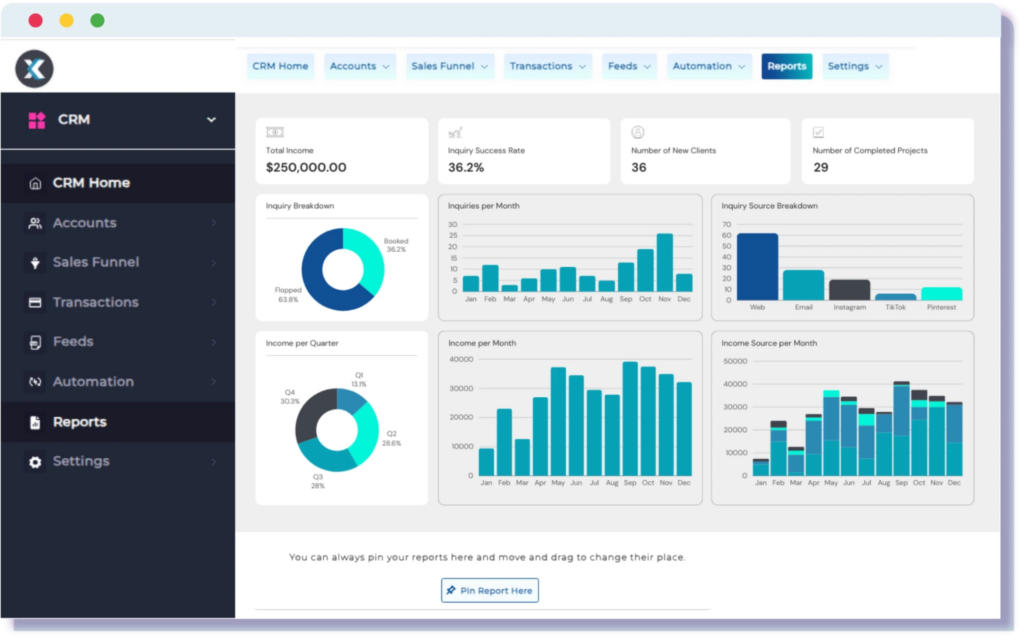
#3 AlphaChat
AlphaChat is a no-code AI chatbot platform designed to improve customer support and claims management for insurers. It enables insurers to automate client interactions while ensuring a personalized experience through its Natural Language Understanding (NLU).
Key Features:
- AI chatbot with self-learning capabilities
- Secure authentication for policyholder interactions
- Automated claims filing and tracking
- Multilingual support for global insurance firms
- Customizable conversation flows
| Pros | Cons |
|---|---|
| No coding required for setup | May need fine-tuning for industry-specific queries |
| Improves operational efficiency | Can require third-party integrations for full functionality |
Pricing:
Available per request.
Best for:
Mid-to-large insurance companies
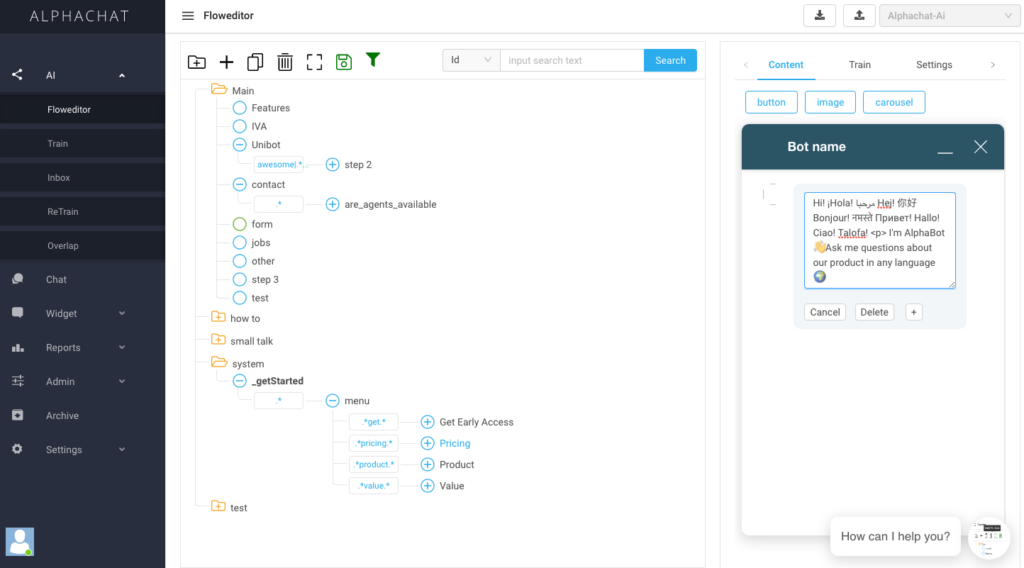
#4 LivePerson
LivePerson leverages conversational AI for insurance through AI-driven conversational bots that improve engagement and reduce response times for policyholders. Its AI-powered messaging platform allows agents to handle multiple inquiries simultaneously, improving efficiency and customer experience.
AlphaChat is a no-code AI chatbot platform designed to improve customer support and claims management for insurers. It enables insurers to automate client interactions while ensuring a personalized experience through its Natural Language Understanding (NLU).
Key Features:
- AI-powered messaging and voice bots
- Sentiment analysis for real-time insights
- Seamless integration with insurance platforms
- Omnichannel support (SMS, WhatsApp, Web, etc.)
- Automated appointment scheduling
| Pros | Cons |
|---|---|
| Enhances customer satisfaction with instant responses | Can be complex to configure for smaller teams |
| Reduces agent workload through automation | Some features are locked in higher-tier plans |
Pricing:
Available per request.
Best for:
Large insurance agencies with high customer interaction
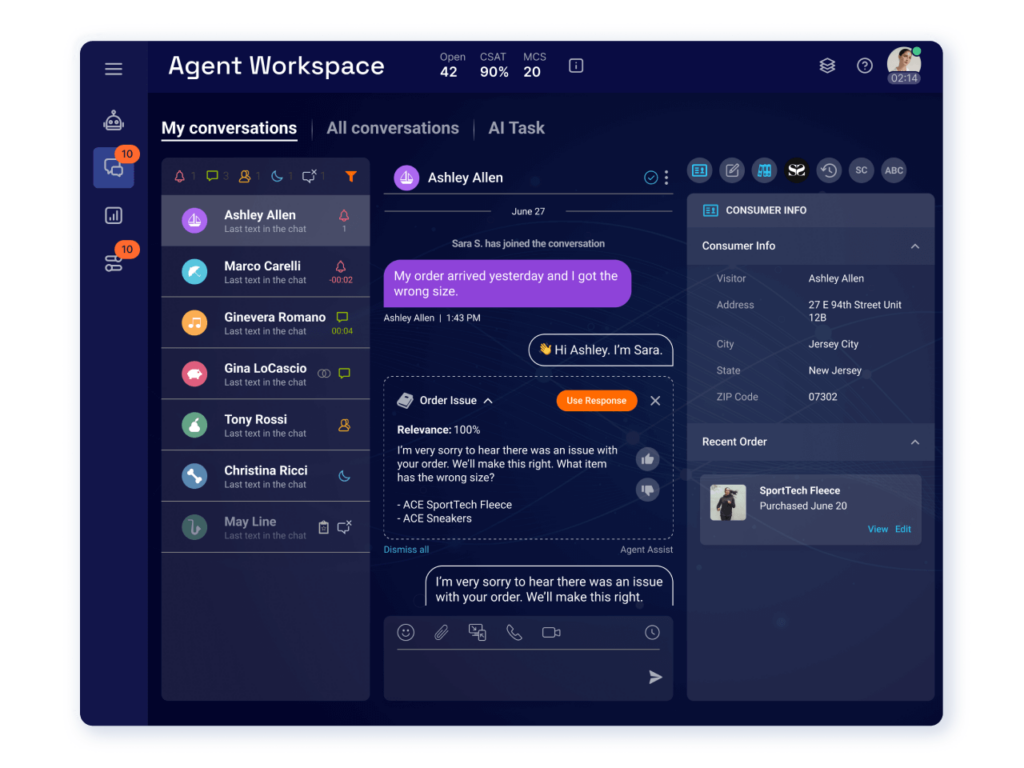
#5 Zendesk Answer Bot
Zendesk Answer Bot automates responses to common queries, helping insurance agents resolve customer issues faster. Its AI-powered Flow Builder allows for smooth automation of customer interactions, reducing support costs and improving CSAT.
Key Features:
- AI-powered chatbot with Flow Builder
- Knowledge base integration for quick answers
- Smart ticket routing and automation
- Omnichannel customer support
- Real-time analytics dashboard
| Pros | Cons |
|---|---|
| Reduces response time for policy inquiries | Limited customization in basic plans |
| Integrates with existing support systems | May require API integrations for advanced workflows |
Pricing:
Starts at $55 per agent/month
Best for:
Agencies focused on customer service automation

#6 Botsify
Botsify offers AI for insurance agencies, delivering AI-driven chatbot solutions to automate lead generation, policy sales, and claims processing. It helps insurance agencies handle a high volume of inquiries, ensuring faster and more accurate responses to client questions.
Key Features:
- AI chatbot with pre-built insurance templates
- Automated lead qualification and customer support
- Human handover for complex queries
- Multichannel support (Web, WhatsApp, SMS)
- Integration with policy management software
| Pros | Cons |
|---|---|
| Helps agents handle high-volume inquiries efficiently | Requires regular updates to maintain chatbot accuracy |
| Reduces operational costs | The free plan has limited features |
Pricing:
Starts at $49 per month
Best for:
Small to mid-sized insurance agencies
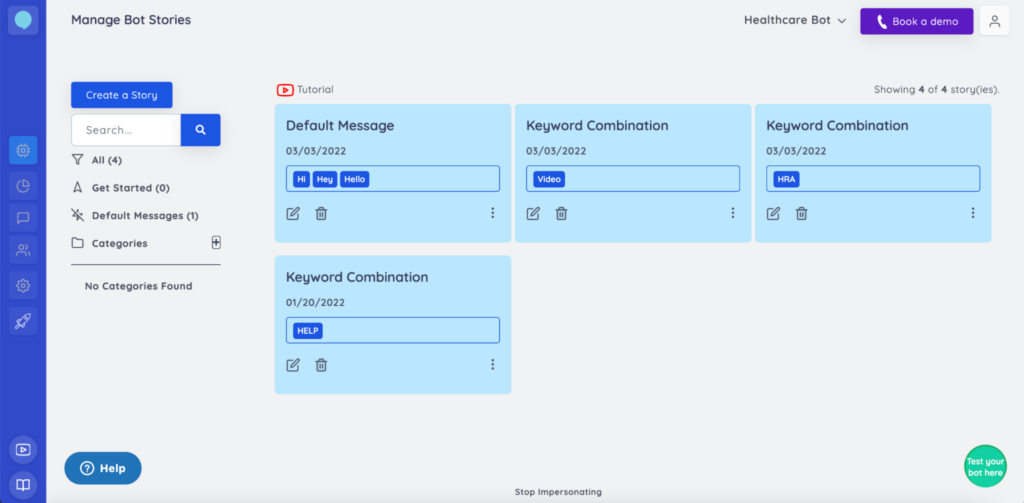
#7 Arteria AI
Arteria AI specializes in AI-powered contract management for insurers, helping streamline policy generation and compliance. Its ML capabilities enable insurance companies to quickly analyze, compare, and generate contracts with accuracy.
Key Features:
- AI-assisted contract creation and analysis
- Automated policy comparisons and risk assessments
- Machine learning for regulatory compliance
- Integration with document management systems
- Real-time policy updates and tracking
| Pros | Cons |
|---|---|
| Speeds up policy generation and risk assessment | Higher learning curve for smaller teams |
| Enhances compliance trackings | Requires integration with existing software |
Pricing:
Available per request.
Best for:
Large insurance firms and brokers
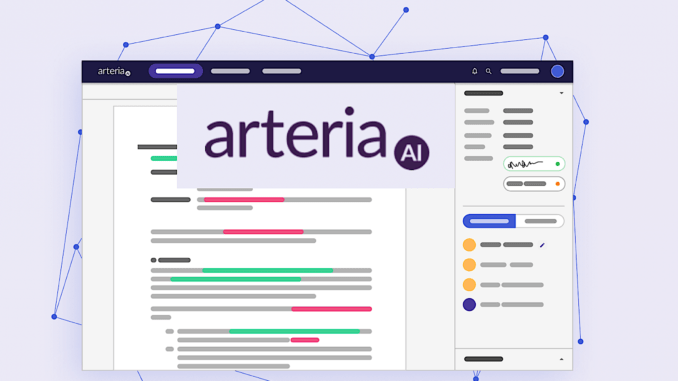
#8 HubSpot Smart CRM
HubSpot Smart CRM helps sales, marketing, and customer service teams achieve better results fast. The platform uses AI to centralize customer data and give teams the context needed to establish the best possible customer experiences.
Key Features:
- Automatic contact data enrichment from web resources, emails, calls, and more
- AI-powered customer conversation summaries
- Automatic data duplication removal
- Purchase intent signal tracking
- Form shortening
| Pros | Cons |
|---|---|
| Reduces manual workloads for teams | Per-user pricing model limits scalability |
| Unifies data from across departments | AI works on a credit-based system |
Pricing:
Starts at $45 per month for one user, paid annually.
Best for:
Medium and large-sized companies looking to unify workflows across different departments.
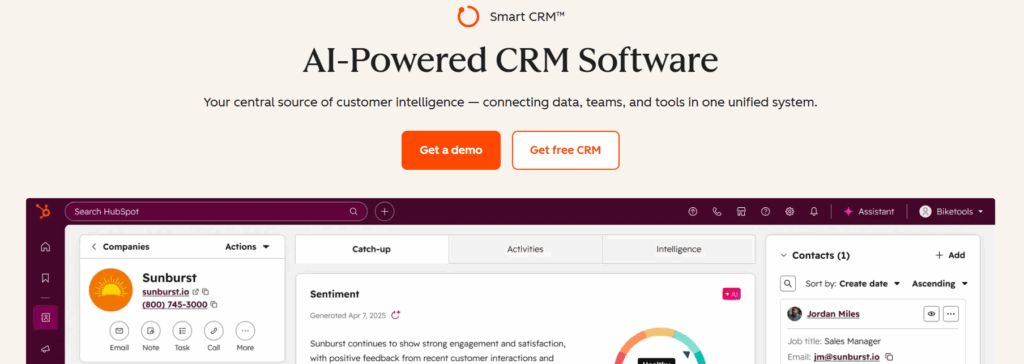
#9 Limitless
Rewind AI provides a searchable recording of everything that happens on a user’s computer, helping insurance agents track conversations, retrieve past policy discussions, and ensure regulatory compliance with accurate documentation.
Key Features:
- AI-powered search for past interactions
- Automated recording and indexing
- Voice-to-text transcription for documentation
- Secure storage with encryption
- Integration with CRM and email systems
| Pros | Cons |
|---|---|
| Helps agents easily recall customer interactions | Requires ample storage space |
| Reduces errors in policy discussions | Limited mobile compatibility |
Pricing:
Not available on the website
Best for:
Large insurance firms and brokerss

#10 Gradient AI
Gradient AI is a powerful AI-driven platform that helps insurers optimize underwriting and claims management. By leveraging advanced ML models, Gradient AI enhances risk assessment, automates claims processing, and improves fraud detection.
Key Features:
- AI-powered risk assessment for underwriting
- Automated claims processing with predictive analytics
- Fraud detection through machine learning models
- Seamless integration with existing insurance systems
- Customizable AI models based on industry data
| Pros | Cons |
|---|---|
| Improves accuracy in underwriting decisions | Requires substantial data for optimal performance |
| Enhances fraud detection capabilities | Implementation may be complex for smaller agencies |
Pricing:
Available per request.
Best for:
Insurance firms needing compliance and workflow automation

#11 Limit AI
Limit AI is designed as AI for insurance brokers, offering AI-powered automation for quoting, underwriting, and risk assessment. It reduces manual processes and increases accuracy in policy evaluations.
Key Features:
- AI-based quote generation
- Risk assessment automation
- Surplus lines tax and fee calculations
- AI-driven policy recommendations
- Integration with brokerage systems
| Pros | Cons |
|---|---|
| Speeds up quoting and underwriting | Requires customization for specific agencies |
| Reduces manual errors in policy processing | Some features are limited to enterprise plans |
Pricing:
Available per request.
Best for:
Insurance brokers optimizing underwriting processes

#12 Novidea
Novidea offers an AI tool for insurance brokers that helps streamline customer relations, policy administration, and sales automation, improving operational efficiency.
Key Features:
- AI-powered brokerage CRM
- Automated sales and customer engagement
- Policy lifecycle tracking and reporting
- Workflow automation for agencies
- Data analytics for client insights
| Pros | Cons |
|---|---|
| Improves efficiency in policy administration | Requires system integration for full functionality |
| Enhances customer relationships with AI-driven insights | Advanced features may require training |
Pricing:
Available per request.
Best for:
Large insurance agencies and brokerage firms
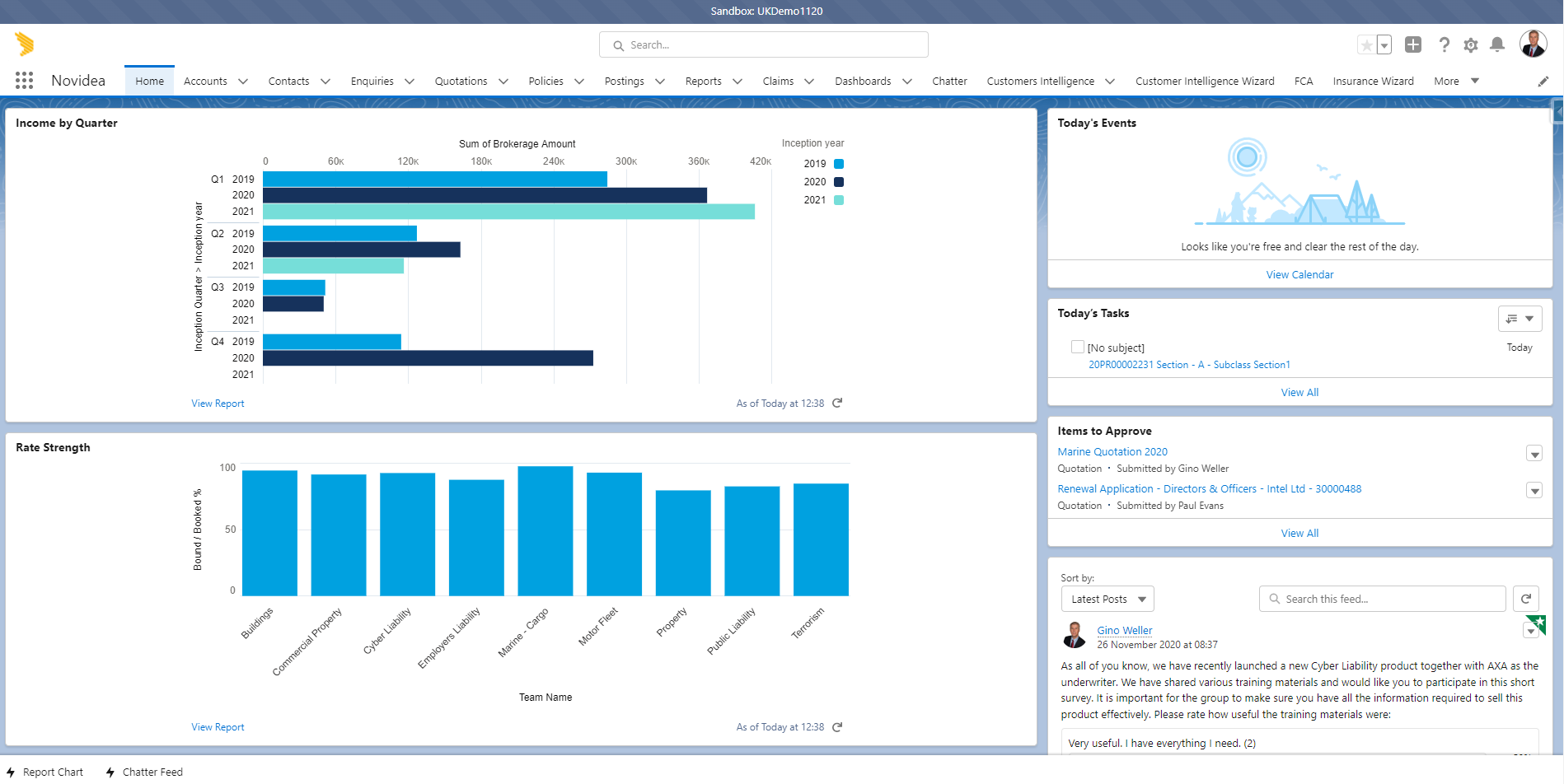
#13 Jasper AI
Jasper AI is an AI-powered content generation tool helping insurance agents create marketing materials, client emails, and blog posts to improve outreach and brand authority.
Key Features:
- AI-generated marketing copy
- Automated blog and email writing
- Content optimization for SEO
- Customizable tone and style
- Multi-language support
| Pros | Cons |
|---|---|
| Saves time on content creation | Requires manual review for accuracy |
| Helps maintain consistent brand messaging | Subscription cost may be high for smaller agencies |
Pricing:
From $59/seat/month
Best for:
Insurance agents needing automated marketing content
#14 Chisel AI
Chisel AI specializes in automating document processing for insurers, enabling rapid analysis of policy documents, contracts, and regulatory paperwork to enhance insurance efficiency.
Key Features:
- AI-powered document parsing and classification
- Automated contract analysis
- Policy compliance checking
- Machine learning for text extraction
- Integration with insurance software
| Pros | Cons |
|---|---|
| Speeds up document review and compliance checks | Requires training for optimal accuracy |
| Speeds up document review and compliance checks | High initial implementation cost |
Pricing:
Starts at $9 per user/month. Free version available.
Best for:
Insurance firms handling large volumes of paperwork

#15 Shift Technology
Shift Technology is a leading AI-powered platform specializing in claims automation and fraud detection for insurance companies. It helps insurers streamline claims processing, detect fraudulent activities, and improve decision-making using advanced data analytics.
Key Features:
- AI-powered claims automation to speed up processing
- Advanced fraud detection using machine learning algorithms
- Real-time risk assessment and decision support
- Seamless integration with existing insurance platforms
- Predictive analytics for better fraud prevention
| Pros | Cons |
|---|---|
| Improves accuracy in claims and fraud detection | Requires customization for optimal results |
| Reduces operational costs and manual workload | Implementation may be complex for smaller insurance firms |
Pricing:
Available per request.
Best for:
Insurance companies aiming to optimize claims processing and strengthen fraud detection mechanisms

#16 Aveni
Aveni provides AI-powered compliance and risk management solutions for insurance firms, using AI-driven speech analytics to enhance compliance monitoring and quality assurance.
Key Features:
- AI-powered speech analytics
- Compliance risk monitoring
- Automated quality assurance checks
- Voice data analysis for policy adherence
- Integration with customer call systems
| Pros | Cons |
|---|---|
| Helps meet regulatory compliance standards | Requires training for optimal accuracy |
| Enhances call quality monitoring | Integration needed for seamless workflow |
Pricing:
Available per request.
Best for:
Insurance firms needing AI-driven compliance monitoring

AI Voice Assistants vs. Chatbots: What Insurance Teams Need to Know
Chatbots and AI voice assistants can sound similar—they’re both forms of virtual assistants—but their roles are quite different. While AI chatbots are great for handling quick written queries, AI voice assistants take it a step further by offering real-time, human-like conversations over the phone.
So, what’s the difference?
- Chatbots are helpful for basic, text-based tasks like updating contact info or sharing links to policy documents. But they’re limited when emotions, urgency, or complex questions enter the picture.
- AI Voice Assistants, like CloudTalk’s, speak with customers in real time—handling phone calls with natural, human-like responses. They guide clients through claims, confirm policy coverage, qualify inbound leads, and escalate calls only when needed.
| Features | Chatbots | AI voice assistants |
|---|---|---|
| Channel | Web/app messaging | Phone calls |
| Use Case | FAQs, document links, form filling | Claims intake, renewals, real-time inquiries |
| Tone | Text-based, limited nuance | Human-like, handles emotion and urgency |
| Availability | 24/7 | 24/7 |
| Escalation | Manual or scripted | Smart routing to agents |
| Best for | Simple, low-stakes queries | Complex, time-sensitive conversations |
Which Virtual Assistant Is Right for Your Team?
Think of chatbots and voice assistants as complementary, not competing. If you’re automating high-volume web traffic or mobile support, chatbots are ideal. But when clients pick up the phone—often stressed, confused, or in urgent need—AI voice assistants provide the speed and empathy text can’t match.
CloudTalk’s AI Voice Agent is an AI agent for insurance, designed specifically for those high-stakes moments, ensuring policyholders feel heard—even before a human picks up.
For full coverage, many insurance teams choose to combine both—automating across channels while keeping service human where it matters most.
5 Ways AI Improves Policyholder Engagement
We’ve touched on several of the benefits that AI for life insurance agents can provide, but if it were not clear, here are 5 powerful ways AI helps you keep policyholders engaged and coming back:
- Faster Claims Processing: AI automates claims evaluation, reducing the time needed to assess, approve, or reject claims, leading to quicker payouts.
- Enhanced Fraud Detection: Machine learning models analyze claims data to detect suspicious activity, reducing fraudulent payouts and financial losses.
- Improved Customer Service: AI chatbots and virtual assistants handle policy inquiries, claims tracking, and support requests 24/7, enhancing customer satisfaction.
- Better Risk Assessment: AI-driven analytics evaluate applicant data, helping insurers price policies more accurately and reduce underwriting risks.
- Operational Efficiency & Cost Savings: Automating repetitive tasks, like document processing and customer verification, frees up time and reduces administrative costs.
How to Choose the Right AI Tool for Your Insurance Business
Selecting the right AI solution is crucial for maximizing efficiency and ensuring compliance. Radixweb reports that insurers who build AI insurance software tailored for claims automation reduce processing time by up to 60%. Below are the key factors insurance agents should evaluate before investing in AI tools:
- Compliance & Security: Ensure the tool meets HIPAA, GDPR, and industry regulations, with encryption and access controls for data protection.
- Integration with Existing Systems: Look for CRM and policy management software compatibility to streamline workflows. Tools that support a streamlined contract approval workflow can further enhance document handling, policy sign-offs, and agreement tracking within your existing systems.
- Automation Capabilities: Identify tools that automate claims processing, fraud detection, underwriting, and customer service effectively.
- Scalability: Choose a solution that adapts to growing policy volumes and supports agencies of different sizes.
- Pricing & ROI: Evaluate the total cost vs. expected benefits, ensuring the tool improves efficiency and reduces costs.
Can AI Replace Human Agents in Insurance?
Nearly half of policyholders prefer a digital-first experience—but only if they can still speak to a real person when it matters.
So that pretty much answers the question. There are things only humans do best, like building trust, handling complex situations, and delivering personal service. But AI can take care of the repetitive, boring stuff that slows agents down.
What AI can do:
- Automate claim intake and policy renewals
- Answer common questions 24/7 via voice assistants or chatbots
- Summarize call transcripts and flag urgent issues
- Identify churn risks and upsell opportunities through analytics
What AI can’t do:
- Handle sensitive customer conversations with emotional intelligence
- Explain nuanced policy terms in context
- Build long-term relationships based on trust
- Make judgment calls in edge cases
The reality is, most policyholders still want a human voice—especially when filing a claim, making big decisions, or dealing with stress. AI enhances those conversations, but it doesn’t replace them.
How to Build a High-Impact, AI-Powered Insurance Agency
Building an AI-powered insurance agency doesn’t mean chasing the latest tech. It’s about solving real problems faster, smarter, and at scale. The key? Focus on automation where it counts, choose the right tools, and keep your team at the center of the transformation.
Here’s a step-by-step guide to help you get it right:
- Start With the Pain Points
Before jumping into tools, map out the high-friction areas of your workflow. Think: quote requests, document handling, claims intake, or customer follow-ups. These are prime spots where AI can save serious time and improve consistency. - Pick the Right Tools (Not the Flashiest Ones)
Choose platforms that plug into your existing systems and support real use cases—like CRM tools with AI analytics, or voice platforms like CloudTalk that can automate call summaries, route leads, or handle claims triage in real time. - Automate What Slows You Down
Use AI to extract data from policy PDFs, validate claims details automatically, or guide customers through quote forms with voice or chat assistants. It’s not about replacing people—it’s about removing bottlenecks. - Train Your Team Early and Often
The best AI strategy falls apart without buy-in. Give your agents hands-on training, show them how AI supports—not replaces—their role, and focus on use cases that improve their day-to-day. - Keep It Ethical and Transparent
Make sure your AI systems are trained on clean, unbiased data. Set clear guidelines to avoid unfair decisions in risk assessments or underwriting, and stay compliant with data privacy standards. - Review, Adjust, Repeat
AI isn’t a set-it-and-forget-it project. Track performance, gather feedback, and adapt. Use built-in monitoring tools (most platforms offer them) to continuously improve and make smarter decisions as your agency scales.
Ensure Your Business’ Future with CloudTalk
Although many customers and agents fear that AI will replace all human interactions, we’re still very far from that happening. And until then, insurance agents need all the help they can get reaching new applicants and answering customer questions.
Luckily, CloudTalk’s Conversational Intelligence AI can do just that. Remove time-consuming contact management from your daily workflows and efficiently personalize your conversations to deliver a better experience at every turn.

See What CloudTalk Can Do For Your Insurance Team

Source:













